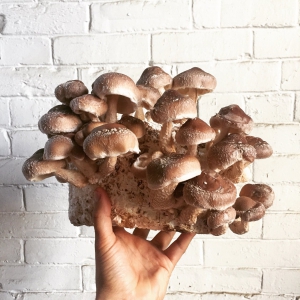NASA building homes made of fungi for Moon, Mars
Instead of habitats made of metal and glass, NASA is exploring technologies that could grow structures out of fungi to become our future homes in the stars, and perhaps lead to more sustainable ways of living on Earth as well.
Creating a livable home for future astronauts means doing more than growing a roof to go over their heads.
Astronauts will need to have all their basic needs met, just like on Earth, and face the additional challenges of living in a harsh environment on a distant world, the US space agency said in a statement.
Keeping that in mind, the myco-architecture project out of NASA’s Ames Research Center in California is prototyping technologies that could “grow” habitats on the Moon, Mars and beyond out of life – specifically, fungi and the unseen underground threads that make up the main part of the fungus, known as mycelia.
“Right now, traditional habitat designs for Mars are like a turtle – carrying our homes with us on our backs – a reliable plan, but with huge energy costs,” said Lynn Rothschild, the principal investigator on the early-stage project.
“Instead, we can harness mycelia (vegetative part of a fungus) to grow these habitats ourselves when we get there”.
Click here for the full article
Researchers from Tohoku University suggest that consuming mushrooms on a regular basis reduces the risk of prostate cancer in men - especially those aged 50 or older.
It’s a love or hate ingredient, but a new study has revealed a link between eating mushrooms and lower risk of prostate cancer. Researchers from Tohoku University suggest that consuming mushrooms on a regular basis reduces the risk of prostate cancer in men - especially those aged 50 or older. Dr Shu Zhang, who led the study, said: "Test-tube studies and studies conducted on living organisms have shown that mushrooms have the potential to prevent prostate cancer. "However, the relationship between mushroom consumption and incident prostate cancer in humans has never been investigated before. "To the best of our knowledge, this is the first cohort study indicating the prostate cancer-preventive potential of mushrooms at a population level.”
In the study, the researchers surveyed 36,499 men about their lifestyle choices including food consumption, psychical activity and smoking and drinking habits, and analysed their medical records. The results revealed that overall, 3.3% of the participants developed prostate cancer during a follow-up period. However, participants who ate mushrooms once or twice a week had an 8% lower risk of developing the disease, compared to those who ate mushrooms less than once a week. Meanwhile, men who ate mushrooms more than three times a week had a 17% lower risk.
Source: Shivali Best, Mirror online
This cutting-edge psychedelic tech company with its roots in innovative cannabis treatment modalities has developed a patent-pending nasal spray for microdosing psilocybin --and users love it.
Silo Wellness, an Oregon company with a team with roots in cannabis delivery modalities, has developed a magic mushroom nasal spray for controlled, metered-dosing consumer microdosing. The company predicts that new users will be more drawn to experimenting with psilocybin’s wellness effects with convenient microdosing before they commit to the full-blow psychedelic “trip” sessions.
“I love our product and can’t wait until it’s legal in the United States, so we can share it with crime victims and first responders,” Silo Wellness founder Mike Arnold said. After formulating the product in Jamaica (where mushrooms are legal) with a team led by Missouri pharmacologist Parag Bhatt and company COO and Marine combat veteran Scott Slay, team members first tested the product on themselves before taking volunteers’ testimonials in private microdosing sessions.
The “Origin Story” of Silo Wellness and their Metered-Dosing Solutions
The visionary inventors of Silo Wellness’s first product to be publicly disclosed under their intellectual property have been working on this project since “before it was cool.” “National media didn’t care about psychedelics until Denver passed their decriminalization ballot measure,” Arnold stated. “Before that, everyone thought I was crazy when I told them that we were entering the medicinal psychedelics space in advance of Oregon legalizing in 2020.”
Silo Wellness founder Mike Arnold made headlines when he exited the practice of law to ultimately grow 40,000 marijuana plants in Oregon in 2017. “I had been hobby farming livestock for years. Since I was a kid, I always dreamt of farming fulltime. I just couldn’t pass up the cannabis opportunity when it presented itself. But I never thought I would exit cannabis and pivot full time into psychedelics, but they changed my life. I want to share this medicine with the world by making it affordable and comfortable for all.”
Arnold was a high-profile criminal defense attorney from Oregon before retiring to start his farms. He made national headlines for his part in stopping the armed Malheur Refuge Occupation led by his then-client Ammon Bundy. He was also featured in in two episodes of 48 Hours and successfully defended a marine sniper’s road-rage shooting murder case for which he wrote a well-reviewed book on self-defense in the criminal justice system that was banned in Oregon prisons.
The “Shroom Boom” is the “New Cannabis Green Rush” and the Peer-Reviewed Studies Are Even Stronger than Marijuana
With ROI reducing in cannabis startups in Canada and the United States, Arnold watched investors and hopeful entrepreneurs in his home state of Missouri still blindly running full speed to the new Missouri medical marijuana market, as it was gearing up to pass in 2018. “While everyone else saw the excitement for Missouri cannabis as a good sign for an investment, I saw it as the death nail. When everyone is running in one direction, that’s the last place an entrepreneur or investor wants to be. If you were on time for cannabis, you were already too late.”
That’s why Arnold began working with the inventor of the patent-pending Mystabis hemp and marijuana inhalers, Michael Hartman, to begin the brainstorming for their newest product line of metered-dosing solutions.
“I came a little late to the magic mushroom space as a user,” Arnold continued. “I had no information about the medicinal benefits for PTSD and anxiety until I met a doctor while traveling in the spring of 2018 who blew my mind with the research and offered to take me on a guided meditation with mushrooms right there on the spot. I told him I was terrified to use them. ‘How do you know how much you are ingesting? What if I take too much?’ I asked.”
“He replied, ‘Mike, you know me; I’m a doctor.’ Enough said,” Arnold recalls. “I trusted him and it changed my life. Mushrooms have been life-changing and I want to share this healing opportunity with the world with a purpose-driven company mindful of consumer access to these gifts of nature.”
What Is The 'Mushroom Of Immortality'?
Nicknamed the "mushroom of immortality" in English, Ganoderma mushrooms are known as "reishi" in Japanese and as "lingzhi" in Chinese. Ganoderma is a group of fungi that break down wood or cause white rot on certain tree species in the environment. Humans use Ganoderma fungi to treat anything from the flu to cancer. Some consume it as a preventative anti-inflammatory treatment. It's even marketed as a superfood. Reishi/lingzhi has been referenced as far back as 100 B.C. as a supplement used to improve human health.
Studies have found promising immune-boosting effects of the mushroom of immortality, particularly for those who are ill and less so for those that are healthy. Unsurprisingly, the reishi/lingzhi trade industry has a global market of more than $2.16 billion or approximately 2% of the worldwide dietary supplement sales. Recently, scientists tested 20 manufactured products of Ganoderma, including pills, tablets, teas and other consumables as well as 17 grow-your-own kits that were labeled as containing the species Ganoderma lucidum.
Author: Linh Anh Cat
Read the full articel here























